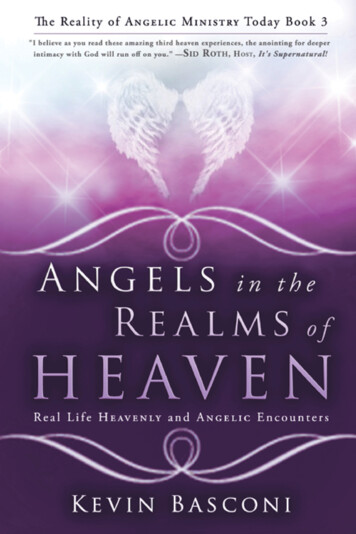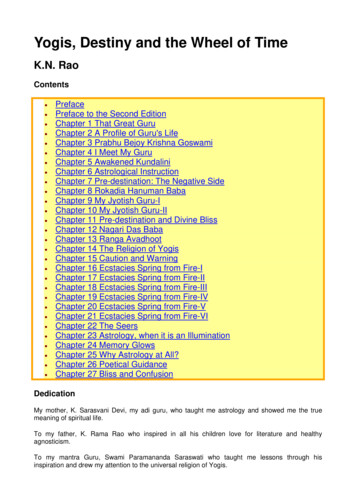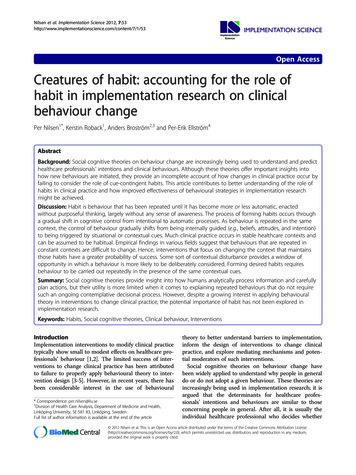
Transcription
1when we’re through we don't need self-control toperform that action; we do it without thinking." Shealso added, "Our habits are our destiny. Andchanging our habits allows us to alter thatdestiny."In her book, Better Than Before: What I LearnedAbout Making and Breaking Habits, GretchenRubin called habits "the invisible architecture ofdaily life.I agree with all that. Our habits become our pathsthat move us through life. Our habits are criticalto shaping the course of our lives. The question isnever: “Do I have a habit?”Of course you have habits. If at least 40 percent ofwhat you do each day is some form of repetition,then the question is always: “What kind of habitsdo I have?”We repeat about 40 percent of our behavior almostdaily, so our habits shape our existence, and ourfuture."Gretchen Rubin explains that habits reduce theneed for self-control, saying, "With habits, weconserve our self-control.Do my habits ADD value to my life? Do my habitsTAKE value from my life?Do my habits enable me to grow, to develop, tomature, to deepen as a person? Do my habits hobbleme: I become stagnant; I become rigid; I becomeless curious and, frankly, less engaged; I rarelyventure beyond what is comfortable and familiar.Because we're in the habit of putting a dirty coffeecup in the dishwasher, or simply washing the cup
2We all have habits. I like a neat and organized life. Idon’t apologize for liking a neat and organized life.It works for me. I thrive with routine. I’m wearing abutton-down collar shirt today because I like it. Idon’t care if you like it. You don’t have to like it.I’m wearing it. I like it.I know what my habits are. Do you know what yourhabits are? And if you say, “I don’t have habits.”Then that’s your habit.Now the whole purpose behind habits and behindroutines is hopefully to live a better, life.But what do you do when your habits of life; whenyour expectations about the routines that shape yourlife are broken?I ran across this quote from Ben Patterson: “Godmust reserve for Himself the right of the initiative,the right to break into my life without question orexplanation.That shattering phone call, that disturbing letter, .may indeed be the first stage of God's interruptionin my life. . Since God does the initiating, Hemust be responsible for the consequences.Scripture does teach this.CONSIDER GOD’S INITIATIVE with Job. It isGod who says to Satan: “Have you considered myservant Job?”CONSIDER GOD’S INITIATIVE with Moses. Itis God who caused the bush to be burned andcaptured the attention of Moses.CONSIDER GOD’S INITIATIVE with the OldTestament prophets. I often wonder about the OldTestament prophets: the vision of Obadiah the word of the Lord that came to Joel the word of the Lord that came to Hosea the oracle that Habakkuk the prophet sawAlways the initiative of God. Always God comingto them. And their lives were never the same.WHATEVER routine expectations that Job had:Job, who was a moral exemplar; Job the man ofrighteous habits.WHATEVER routine expectation of life, thatMoses had: Moses, once an Egyptian prince, now aBedouin shepherd; Moses, the man already in his80’sWHATEVER the routine expectations of all theprophets. WHATEVER they were: their habitsand routines: God changed them. God upendedthem.So CONSIDER GOD’S INITIATIVE on this day,with young Mary, the Galilean maiden. It is AllGod’s initiative.Who are the 15, or 16, or 17 year old girls that youknow in your life? Is this the age of your daughter?Your granddaughter? Have you taught a girl thisage in Bible class?Think of what you know of them. What are theirinterests? What kinds of things are important tothem?
3Are they still learning self-confidence? Can theyhold your eye when you look at them and when youspeak to them? Are they self-conscious about theirown changing bodies?Are they easily embarrassed? Do they seek attentionor are they more likely to avoid attention? Youknow they feel uncomfortable when they becomethe center of attention.Why would young Mary in our text, in her time, befundamentally different as a 15, 16, or 17 year oldgirl in her culture;why would young Mary be different from any ofthe girls of that age that you know as you wouldconsider them in our time, in our culture?Ant that’s precisely the point: Mary was notfundamentally different. She was a virgin betrothedto a man in her Galilean hometown of Nazareth.of this stuff that has accrued, that has glommedon to Mary over the centuries about how “special”Mary was even before the angel greets her: all that stuff is just unfounded speculation; and reallynot very helpful.I ran across a story. 5-year-old Olivia, and her bestfriend, 5-year-old Claire, had parts in theirkindergarten nativity play. Claire was Mary.Olivia was an angel.Before the big show a young boy, another memberof the cast, was making the rounds to each child inthe dressing room. "I'm a sheep, what are you?"Each child responded politely.When he asked Olivia she proudly declared. “I’man angel.” The little boy then turned to Claire.At that moment, Claire was struggling to getinto her costume. To be more precise, Claire’smother was struggling with Claire to get Claireinto her costume.The little boy: "I'm a sheep, what are you?"Claire, exasperated, simply said, "I'm Mary."Realizing he was now face to face with a leadcharacter, in the big show, the little boy now feltcompelled to justify his own role. "It's hard beinga sheep, you know," he said with all theseriousness of a 5-year-old actor playing a very bigpart.That – itself – automatically makes Mary reallynormal in her culture.You’ve seen plenty of young Mary’s walkingbehind their mothers at Walmart in Macedon, orgetting off the bus, or waiting in the early morningdarkness to get on the school bus.Mary was utterly normal. Mary wasn’t looking tostand out. Mary wasn’t looking to be different. Infact, being different, in Mary’s culture was evenmore awkward, and potentially dangerous, thanbeing different today. Mary wasn’t different.I see Mary as quite compliant. Mary was followingthe expected path of life for a girl in her culture. All5-year-old Claire, mother tugging at her costume,was equally serious in her dead-pan response, but probably more profound: "Yes, I know. “But it'salso hard being a virgin, you know.”Mary was no different. Mary was an ordinaryyoung woman. Mary’s life had a familiar future:Mary knew what was coming next in her life.There would be the wedding with Joseph. It was tobe expected that within one or two, at most threeyears, Mary would produce children, and thenMary’s life would be totally defined thereafter byher domestic responsibilities. This was normal andfamiliar. This was safe.
4This was not an Oprah moment for Mary: “Youget car! You get a car! You get a car!”Gabriel’s appearance was no ANSWER to Mary’sprayer. Mary had NOT been praying: “God use meto be the vessel for the birth of your Messiah.”Mary had NOT been praying: “O God, please getme out of my marriage to Joseph.”Mary herself had seen this same trajectory of lifetake shape in the lives of ALL the other females sheknew. No exception. Girls, especially girls, whoWERE different FROM that norm simply didn’tlast very long inside the normal social culture ofMary’s day.We can think whatever we may want to think today, about how confining or how limiting thosesocial boundaries and those social expectationswere for young Mary, in young Mary’s day.But IF Mary was at ALL normal, THEN it nevereven crossed Mary’s mind for her to EVENconsider that there MIGHT be a different way FORMary to look at her life; at what she COULDexpect from her life.And it is in THAT moment of unobtrusive,unobserved normality that GOD TAKES THEINITIATIVE to interrupt Mary’s life.The angel Gabriel sent from God: “Greetings, Ofavored one, the Lord is with you!” But she wasgreatly troubled at the saying, and tried to discernwhat sort of greeting this might be.Mary’s response to the angel Gabriel was thestandard response to an angel. Mary was troubled.Zechariah had been troubled when Gabrielappeared to him: “Fear” fell upon Zechariah. Butthe initial response of fear is where the similaritybetween Zechariah and Mary stops.Because after Gabriel says to Mary: “Do not beafraid,” IF Mary IS afraid: we never know it; wenever see it.And please think about this from youngMary’s point of view.As I was studying this and thinking about this thisweek. I have a hard time imagining that Maryreally did take in anything much into her headafter she heard the words:Now a LOT of good stuff comes after that. He will be great. He will be called the Son of the Most High. The Lord will give Him the throne of His father,David. He will reign over the house of Jacob forever. His kingdom will have no end.”ALL GOOD STUFF RIGHT?
5“Could you go back to the ‘conceive in my womb’part? I’m just a little fuzzy on the ‘conceive inmy womb’ part if you don’t mind?”Mind blown!In Mary’s culture to become pregnant whilebetrothed was at a bare minimum bareminimum a cause for intense shame.THE LEVITICAL HOLINESS CODE,particularly what we read in our chapters 18and 20;Combine that withTHE HISTORICAL NARRATIVES OF THECONQUEST OF THE LAND and the failureofGod’s people to remain sexually pure butinstead to take on the sexual morals andpractices of the nations around themCombine that withTHE MORAL TEACHINGS OF THE PROVERBSCombine that withone of God; you have found favor with God.”That’s how you greet me.Then you tell me I will become pregnant like right now. I know how my people treat unmarried,pregnant girls. And especially, how they treat them if that unmarried, pregnant girl is betrothed.So exactly how Gabriel is what you justdescribed God blessed?” That doesn’t make anysense to young Mary, the normal young maidenfrom Galilean village of Nazareth.And just like Gabriel accurately interpretedZechariah’s question about fathering a child in oldage; Gabriel accurately heard the disbelief inZechariah’s question.Gabriel did not hear disbelief in Mary’s question:“How can this be, since I am a virgin?”THE PROPHETIC PRONOUNCEMENTSAGAINST SEXUAL IMMORALITYAnd then layer all of thatvery heavily withCENTURIES OF RABBINIC INTERPRETATIONAND APPLICATION.It is not that Mary would have had a scholar’sgrasp of everything the Scriptures taught andeverything that the Rabbis applied.But Mary would have known :: “Could you goover the ‘conceive in my womb’ part just one moretime.”Mary’s question with reference to her virginity wasnot just a biological question. You’re missing thepoint of Mary’s question if you’re only hearingMary ask a biological question.If you’re only hearing a biological question thenyou’re not hearing Gabriel with Mary’s ears. Ifyou’re only hearing “biology” then you’re makingMary hear with your ears.Automatically, in Mary’s mind, there is acontradiction. “You greet me, Gabriel, as: FavoredMary asks a very honest question - a questionwithout guile - t which Gabriel gives a three-partanswer.First part: The conception in your womb will be awork of the Holy Spirit. You will remain a virgin.Your chastity will not be compromised. Your childwill be holy. In fact, your child will be the Son ofGod. That’s the first part of Gabriel’s answer.Second part of the answer: This IS truly amiraculous matter of great joy. Your aged relativeElizabeth, older than your own mother, well pasther own child-bearing age: she is already sixmonths pregnant!
6If someone wants to dis-believe the miracle of yourpregnancy then they’re going to have to explainway the miracle of Elizabeth’s pregnancy.Mary, this truly is good news of great joy! God isat work. God is accomplishing something large.You are not alone in the purposes of God. Youdon’t need to be afraid. What is happening is a goodthing.Third part of Gabriel’s answer: FOR NOTHINGWILL BE IMPOSSSIBLE WITH GOD! Don’tyou fear, Mary: God IS going to take care of thebiology part.But Mary, don’t fear: God is also going to takecare of the shame part. God will take care of the‘be stoned on the outskirts of town’ partNothing nothing will be impossible withGod!”What Mary could not have known at the time washow God would over-rule the legitimatelyconservative reaction of her betrothed, Joseph.Mary could not have known at the time howJoseph would prove himself to be not only kind but obedient to the Lord. Obedient even ifthat obedience meant Joseph would quietly absorbher shame and would protect her and would protecther child.In that moment, of Gabriel’s announcement Marydidn’t know any of that.Hear this through Mary’s ears. Experience thisthrough Mary’s young maiden’s eyes. If we’reexperiencing this moment real-time with Mary, thenour jaws ought to drop to the floor, and through thefloor when this young Mary then says:, “I amthe servant of the Lord; let it be to me according toyour word.”In that moment with those words this youngGalilean maiden reveals a kind of depth ofobedience to God and trust in God that just beggars staggers the imagination.I call Mary “THE BLESSED” because that is whatMary called herself in her famous prayer. I won’tunpack the prayer. After going in haste down to seeher relative Elizabeth and Elizabeth IS pregnantand Elizabeth rejoices in the pregnancy of MaryMary crafts this magnificent prayer, and shebegins this way:
7To which I reply: “How sexist. How belittling.”Why could young Mary NOT come up with thesewords?If roughly a millennia before when young Davidwas about the same age as young Mary is in ourtext today;And young David could take on Goliath and comeout with those powerful words: “This day the Lordwill deliver you into my hand, that all the earthmay know there is a God in Israel.”(Now liberal scholars don’t believe in theBiblical account of David & Goliath but theystill think it’s a great story; and they don’t accuseDavid of being too young to be so articulate! But Idigress!)If young David can be articulate in the pressure ofthe moment; what prevents young Mary fromcomposing this magnificent prayer?Nothing will be impossible with God.I know what the modern scholars say. The modernliberal scholars say, that Mary never prayed thisprayer. That THIS prayer was simply beyond thecapability of a young, probably illiterate Galileanteenager.Modern liberal scholars say, THIS is a prayercomposed decades later by those first people whobegan to worship Mary and THOSE people PUTthese words into Mary’s mouth.Mary IS blessed.Did Mary feel “blessed when Jesus left home at 30? when Jesus seemed to distance Himself ? when she watched her Son die?But think about Pentecost!!!Think about the legacy!!!
About Making and Breaking Habits, Gretchen Rubin called habits "the invisible architecture of daily life. We repeat about 40 percent of our behavior almost daily, so our habits shape our existence, and our future." Gretchen Rubin explains that habits reduce the need for self-control, saying, "Wi











